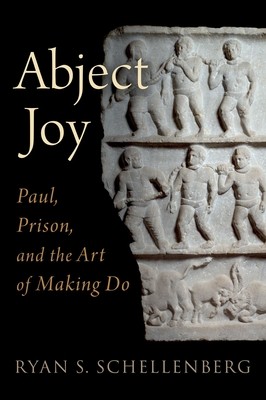
- We will send in 10–14 business days.
- Author: Ryan S Schellenberg
- Publisher: Oxford University Press, USA
- ISBN-10: 0190065516
- ISBN-13: 9780190065515
- Format: 15.8 x 23.4 x 2.5 cm, kieti viršeliai
- Language: English
- SAVE -10% with code: EXTRA
Reviews
Description
No extant text gives so vivid a glimpse into the experience of an ancient prisoner as Paul's letter to the Philippians. As a letter from prison, however, it is not what one would expect. For although it is true that Paul, like some other ancient prisoners, speaks in Philippians of his yearning for death, what he expresses most conspicuously is contentment and even joy. Setting aside pious banalities that contrast true joy with happiness, and leaving behind too heroic depictions that take their cue from Acts, Abject Joy offers a reading of Paul's letter as both a means and an artifact of his provisional attempt to make do. By outlining the uses of punitive custody in the administration of Rome's eastern provinces and describing the prison's complex place in the social and moral imagination of the Greek and Roman world, Ryan Schellenberg provides a richly drawn account of Paul's nonelite social context, where bodies and their affects were shaped by acute contingency and habitual
susceptibility to violent subjugation. Informed by recent work in the history of emotions, and with comparison to modern prison writing and ethnography provoking new questions and insights, Schellenberg describes Paul's letter as an affective technology, wielded at once on Paul himself and on his addressees, that works to strengthen his grasp on the very joy he names.
EXTRA 10 % discount with code: EXTRA
The promotion ends in 23d.04:19:59
The discount code is valid when purchasing from 10 €. Discounts do not stack.
- Author: Ryan S Schellenberg
- Publisher: Oxford University Press, USA
- ISBN-10: 0190065516
- ISBN-13: 9780190065515
- Format: 15.8 x 23.4 x 2.5 cm, kieti viršeliai
- Language: English English
No extant text gives so vivid a glimpse into the experience of an ancient prisoner as Paul's letter to the Philippians. As a letter from prison, however, it is not what one would expect. For although it is true that Paul, like some other ancient prisoners, speaks in Philippians of his yearning for death, what he expresses most conspicuously is contentment and even joy. Setting aside pious banalities that contrast true joy with happiness, and leaving behind too heroic depictions that take their cue from Acts, Abject Joy offers a reading of Paul's letter as both a means and an artifact of his provisional attempt to make do. By outlining the uses of punitive custody in the administration of Rome's eastern provinces and describing the prison's complex place in the social and moral imagination of the Greek and Roman world, Ryan Schellenberg provides a richly drawn account of Paul's nonelite social context, where bodies and their affects were shaped by acute contingency and habitual
susceptibility to violent subjugation. Informed by recent work in the history of emotions, and with comparison to modern prison writing and ethnography provoking new questions and insights, Schellenberg describes Paul's letter as an affective technology, wielded at once on Paul himself and on his addressees, that works to strengthen his grasp on the very joy he names.


Reviews